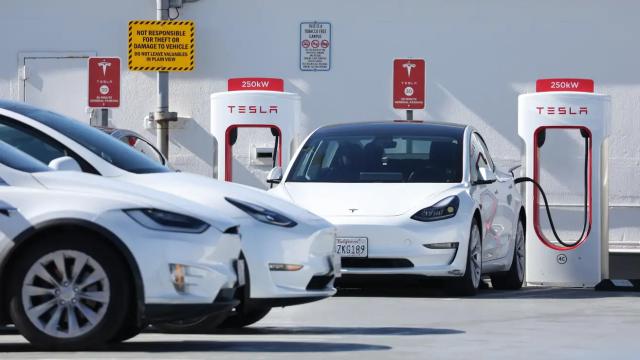We already knew electric vehicles don’t do so well when it gets really cold outside. Well, apparently they don’t really like extreme heat either. According to Automotive News, the recent heat wave across much of the Southern and Western U.S. has brought their range issue to the forefront.
A Seattle-based EV battery and range analytics company called Recurrent has reportedly tested thousands of vehicles in various weather conditions. It found that many vehicles experienced “significant declines” in their range as temperatures rose. Some apparently suffered a 31 per cent drop when temps got about 100 degrees Fahrenheit. That is less than ideal. At cooler temperatures, the outlet reports that the range loss wasn’t as high. There was an average of 5 per cent reduction at 90 degrees and 2.8 per cent at 80, so it’s definitely not linear.
Auto News says that in order to calculate these average temperatures, Recurrent used a blend of data from the 17,000 vehicles the company keeps track of. This data includes 65 EVs and plug-in hybrid models like Tesla’s entire lineup, the Chevy Bolt EV, Hyundai Kona, Nissan Leaf, Ford F-150 Lightning and Mustang Mach-E.
Unfortunately, we don’t know which models did the worst in terms of range loss. However, Recurrent did say that all four of Tesla’s vehicles had the smallest range degradation, but they also had the widest gap between their real-world range and the EPA’s estimates. Part of the reason for their resistance to range loss may be because of their heat pumps, Recurrent’s CEO Scott Case told AutoNews. They’re apparently much more efficient at cooling than standard automotive air conditioners.
The outlet also spoke with Greg Less, the technical director of the University of Michigan Battery Lab. He explained that range decline from heat has its roots in battery chemistry.
“Once you’re above [40 degrees celcius] you start to have a breakdown of the passive emission layer on the anode, and that breakdown will then cause consumption of the liquid electrolyte, which will shorten the lifetime of your battery,” Less told the outlet.
Luckily for EV owners, he doesn’t think the excessive heat will damage EV batteries long term. That’s because they aren’t always driven in 100+ degree weather, and EVs have a fairly robust system to cool batteries.
From what Less says, it sounds like high temperatures aren’t the direct cause of range degradation. It’s got more to do with the fact they use more electricity to run stuff in that sort of weather.
“You’re running the fan harder, you’re running the refrigerant faster. All of these things take more electricity,” Less said to Auto News. “So that’s going to reduce the range.”
